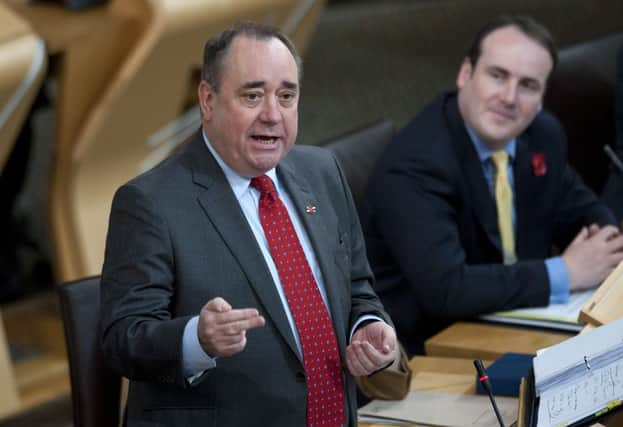Leaders: Wait to gauge success of childcare U-turn


It seems this argument has, to some extent, struck home. Alex Salmond yesterday pledged more nursery provision for two-year-olds in the poorest Scottish households. The First Minister also promised free school dinners for all children in the first three years of primary school.
These policy initiatives are of course to be broadly welcomed. More nursery provision for children from Scotland’s least well-off families can only be a good thing, helping to equip these youngsters with some of the basic advantages other children take for granted, and giving them a better start in life.
Advertisement
Hide AdAdvertisement
Hide AdThe school dinners policy is more contentious – there is an argument that when money is scarce, feeding the children from the wealthiest Scottish households as well as the poorest is not perhaps the best use of resources. While it will be warmly welcomed by the parents of all the children involved, once again the SNP government has chosen to introduce a universal benefit rather than target money on the most needy. The debate on whether this is wise will run and run.
It is, perhaps, stating the obvious, but Scotland did not become independent over the Christmas break. We are still part of the UK. And yet these substantial advances in childcare have still been shown to be possible, under devolution.
So, having apparently responded to the “why not now?” calls, has Mr Salmond enhanced or damaged the case for independence? The answer to that will not be known for some time, but the two possible analyses are clear.
The first is that Mr Salmond has blinked. Stung by the “why not now?” comments he has done his opponents’ work for them by demonstrating that real advances are possible without the need for breaking up the United Kingdom. In doing so, this theory goes, he has devalued what was until recently the SNP’s headline policy for independence.
The alternative analysis is that Mr Salmond has performed a clever manoeuvre. He has demonstrated that his commitment to childcare is not just some ploy in a constitutional power game. On the contrary, childcare is shown to be something on which he has a track record. His promises of “more to come” therefore carry more weight. In this analysis Mr Salmond has simply whetted the voters’ appetite, while convincing them of his sincerity in wanting to bring about real change. One of the big issues in the referendum is trust. Do voters trust Mr Salmond to deliver on his promises? In this analysis, what we saw yesterday was a mark of good faith, and a downpayment for the future.
Games a great chance to sell Glasgow
If Glaswegians take the advice of Rough Guides travel experts, they might well decide to spend this year’s summer holiday at home.
Glasgow is one of the top ten city destinations in the world this year, according to the guide’s assessment of where the action is in the tourism business.
It goes to show what an incredible opportunity the Commonwealth Games is for Scotland’s biggest city, and for the nation as a whole. Glasgow has always been a great destination, offering a vibrant arts scene, great hotels and unbeatable night life, all within a short drive of stunning mountains and lochs.
Advertisement
Hide AdAdvertisement
Hide AdThe arrival of some of the world’s top athletes for Glasgow 2014 is the icing on the cake, as acknowledged by industry specialists.
But the Rough Guides recommendation also shows how high the stakes are. If we get this right, and give tourists a great experience in Glasgow this summer, the benefit in word-of-mouth endorsements and return visits could be huge. This could be a step change for Scotland’s tourism industry.
But if tourists encounter surly waiters and soggy pub lunches, and long queues to get anywhere in a gridlocked city, the stories they tell when they get home may not be much of an advert for our supposedly famous hospitality.
There is much talk around Glasgow 2014 of the legacy it could leave for future generations. Rightly, there is a desire to demonstrate that the tens of millions of pounds spent on a couple of weeks of sport can be of lasting value.
Never has it been more self-evident that this legacy is in our own hands.